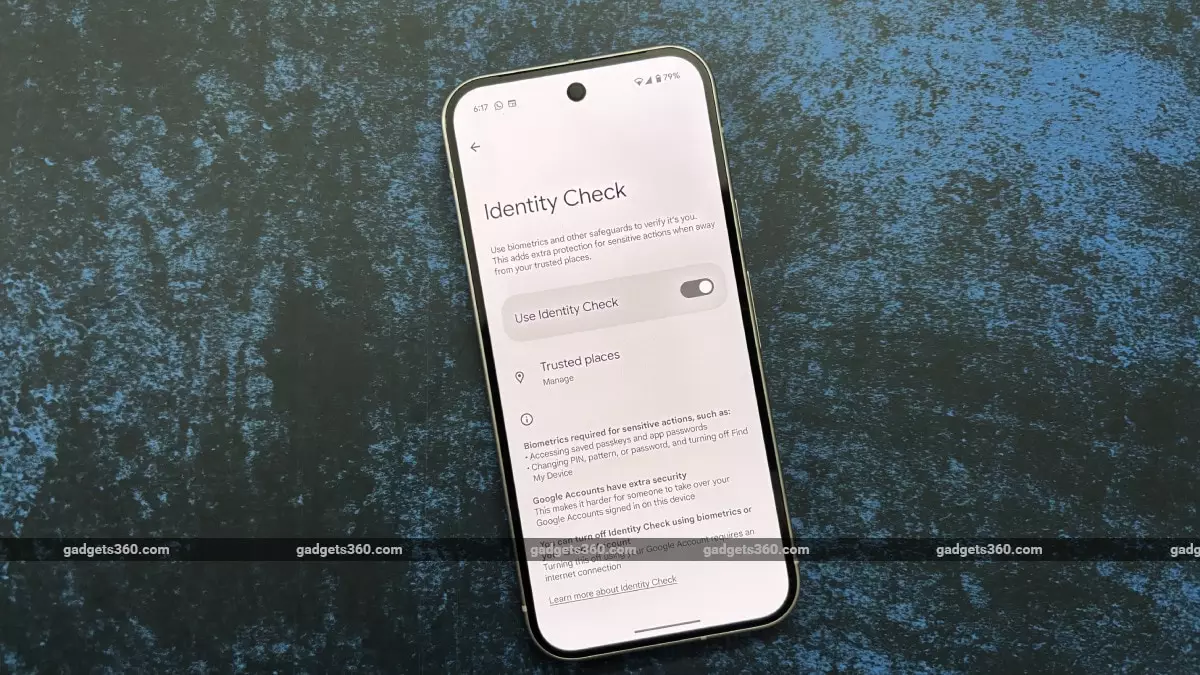In a digital era where our devices are extensions of ourselves, it’s baffling how long it has taken for tech giants to prioritize user security adequately. Google’s upcoming rollout of the Identity Check security feature marks a pivotal moment in enhancing the safety of Android devices, offering a touch of empowerment to users who face the latent threat of mobile theft. This feature represents not just an advancement in technology; it’s a crucial response to the alarming increase in smartphone thefts worldwide. Unlike mere enhancements to user experience, this initiative embodies a stronger stance by tech companies on safeguarding user data from malicious actors.
The Identity Check feature, which has already been spotted in various iterations of Google and Samsung devices, necessitates biometric authentication to access sensitive settings. This requirement arises when the phone is not in a “trusted” environment, a significant paradigm shift that echoes the urgent need for robust security measures in an age where identity theft can happen in the blink of an eye. Unlike simplistic updates that only scratch the surface, this feature directly tackles the heart of the problem, ensuring that critical settings remain untouchable without the owner’s consent.
The Counterpoint in the Apple Ecosystem
While Google is making strides with Identity Check, it’s essential to acknowledge Apple’s proactive approach with its Stolen Device Protection feature. Introduced in the earlier iterations of iOS 17.3, this feature offered a benchmark for security that necessitated biometric authentication for modifying sensitive data settings. However, the growing rivalry between these tech titans illustrates a deeper problem: the inadequacy of comprehensive security measures across platforms. Apple may have edged forward with its initiatives, but competition breeds innovation. Google’s follow-up is a welcome addition that suggests that perhaps both companies are beginning to recognize the dire consequences of digital negligence.
The reality remains that despite both companies stepping up their security protocols, the mechanisms are still somewhat superficial. They act as band-aids rather than a full legislative overhaul of how we perceive device security. The tech industry often dances around the core issues of user data protection, skimming the surface while users drown in a sea of vulnerabilities.
A Must-Have for Modern Android Devices
The anticipation surrounding the Identity Check feature’s widespread adoption is palpable, particularly as more smartphones eventually ship with the Android 16 operating system. Many users have been clamoring for just such protections, and Google’s move not only aligns with consumer demand but offers a practical solution for the majority of users strapped with worries about data safety.
It’s important to observe that the rollout is segregated based on hardware capabilities. Devices must be equipped with class 3 biometric authentication to support Identity Check, raising questions about the disparities in security across devices. While upper-tier models will benefit from advanced features, many users of mid-range devices could feel left in the lurch. This creates a rift in security access that is deeply disconcerting. It underscores a critical aspect of technology: when it comes to safety, shouldn’t it be a universal standard rather than something reserved for the premium models?
Impact on User Trust and Tech Responsibility
In an age where every click is scrutinized, Google’s development indeed represents a move towards increased accountability. The dynamic of user trust hinges on the feel-good factor of having powerful protective measures in place. Users should not have to become security experts to ensure their privacy. By emphasizing easy-to-enable features—such as the requirement of biometrics for critical changes—Google is simplifying security, which should, in turn, enhance user confidence.
This proactive shift signifies a burgeoning responsibility within the tech industry. Companies can no longer shrug off accountability; they must adapt, innovate, and respond to the societal implications of rapid technological advancement. Users are not just passive recipients of technology; they are stakeholders in a digital ecosystem that mandates transparency and, above all, security.
In essence, Google’s Identity Check feature goes beyond mere functionality. It’s a message to users that their security matters, pushing a narrative that technology can evolve responsibly, addressing user concerns amidst ever-present threats. This sentiment should resonate throughout the tech world, prompting others to prioritize user-centric safety in their innovations.


Leave a Reply